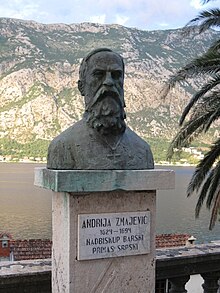music.wikisort.org - Poet
Andrija Zmajević (Cyrillic: Андрија Змајевић; 6 June 1628 - 7 September 1694) was a Baroque poet, the Archbishop of Antivari and a theologian.
Biography
Zmajević was born in Perast, in the Bay of Kotor, at the time part of the Republic of Venice (now Montenegro) in late July 1628. The Zmajević family hailed from Njeguši; when the last members of the Crnojević family left Principality of Zeta, Nikola Zmajević and his cousins Ivaniš and Vučeta moved to Kotor. Becoming appealed and somewhat wealthy, the family quickly converted from Christian Orthodoxy in favor of Roman Catholicism.[1][page needed][2]
Work
He also collected epic and lyric folk songs and transcribed works of the poets of Dubrovnik, notably Gundulić. His only published work, the song "Od pakla" ("Hell") saw the light of day in Venice in 1727. Almost all of his other works remained in manuscripts. He wrote:[3][page needed]
- Hronika or Ljetopis crkveni (Church Annals or Church Chronicles) illustrated by himself and his countryman Tripo Kokolja.
- Svadja Lazarevih kćeri, Brankovice i Miloševice ("The Quarrel of Lazar’s daughters, wife of Branko and wife of Miloš")
- Peraški boj ("The Battle of Perast").
- Slovinskoj Dubravi (Of Slavic Dubrovnik")
- Tripu Škuri ("Of Tripo Škura)
Zmajević's 1675 Church Chronicle had recorded much secular history.[4]
Zmajević wrote both in Cyrillic and in Latin scripts.[5] Zmajević called the language in which he wrote "Slavic" (slovinski).[4] He justified his decision to write in Cyrillic script since it was used by the "Illyrian" and overall Slavic world.[6]
Zmajević saw all the South Slavs as the same people and hoped for the Orthodox Serbs to be united in the Roman faith.[4] He praised Saint Sava, while incorrectly depicting him as faithful to Rome.[4]
Legacy
The Croatian Encyclopedia describes him as a 'Croatian archbishop and writer' and notes that his few remaining works are archived by HAZU.[7]
References
- Ljetopis Crkovni, Mato Pižurica[ISBN missing]
- D. Živković, Zoran (2016). Mediterranean World in Serbian Literature. Belgrade: University of Belgrade. p. 223.
- Poezija Dubrovnika i Boke Kotorske u doba renesanse, baroka i prosvećenosti, Zlata Bojović
- John V. A. Fine, Jr. (5 February 2010). When Ethnicity Did Not Matter in the Balkans: A Study of Identity in Pre-Nationalist Croatia, Dalmatia, and Slavonia in the Medieval and Early-Modern Periods. p. 300. ISBN 978-0472025602. Retrieved 27 March 2022.
- Papović, Dragutin (2009). Primjeri filantropije u Crnoj Gori do kraja XX vijeka (in Serbo-Croatian). Podgorica: Fond za aktivno građanstvo. p. 33. ISBN 978-9940-9210-0-2. Retrieved 2022-03-27 – via Issuu.
- Pantić, Miroslav (1990). Knjizevnost na tlu Crne Gore i Boke Kotorske od XVI do XVIII veka. Srpska književna zadruga. Retrieved 2019-07-04 – via Project Rastko.
illyrica elementa B. Cyrili, quibus universa nostra natio utitur, "sveti Ćirilo takođe istomu jeziku učini slova, kojimi ne samo Dalmacija i Srbija, dali Polonija, Moskovija, Rusija, Moldavija, Bulgarija i ostale države na susjedstvu služe se"
- "Zmajević, Andrija". Croatian Encyclopedia (in Croatian). Miroslav Krleža Institute of Lexicography. 2021. Retrieved 26 March 2022.
Sources
- Prednjegoševsko doba, Titograd 1963.[author missing][ISBN missing]
Другой контент может иметь иную лицензию. Перед использованием материалов сайта WikiSort.org внимательно изучите правила лицензирования конкретных элементов наполнения сайта.
WikiSort.org - проект по пересортировке и дополнению контента Википедии

